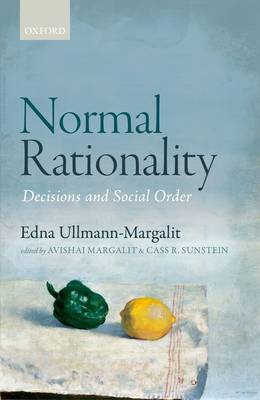
Bedankt voor het vertrouwen het afgelopen jaar! Om jou te bedanken bieden we GRATIS verzending (in België) aan op alles gedurende de hele maand januari.
- Afhalen na 1 uur in een winkel met voorraad
- In januari gratis thuislevering in België
- Ruim aanbod met 7 miljoen producten
Bedankt voor het vertrouwen het afgelopen jaar! Om jou te bedanken bieden we GRATIS verzending (in België) aan op alles gedurende de hele maand januari.
- Afhalen na 1 uur in een winkel met voorraad
- In januari gratis thuislevering in België
- Ruim aanbod met 7 miljoen producten
Zoeken
Normal Rationality
Decisions and Social Order
Edna (formerly Professor of Philosophy, formerly Professor of Ph
Hardcover
€ 126,45
+ 252 punten
Omschrijving
This is a selection of the most important work of Edna Ullmann-Margalit, an unorthodox and deeply original philosopher whose work illuminated the largest mysteries of human life. It centres on two questions: How do people proceed when they cannot act on the basis of reasons, or project likely consequences? How is social order possible?
Specificaties
Betrokkenen
- Auteur(s):
- Uitgeverij:
Inhoud
- Aantal bladzijden:
- 310
Eigenschappen
- Productcode (EAN):
- 9780198802433
- Verschijningsdatum:
- 7/09/2017
- Uitvoering:
- Hardcover
- Afmetingen:
- 160 mm x 241 mm
- Gewicht:
- 636 g

Alleen bij Standaard Boekhandel
+ 252 punten op je klantenkaart van Standaard Boekhandel
Beoordelingen
We publiceren alleen reviews die voldoen aan de voorwaarden voor reviews. Bekijk onze voorwaarden voor reviews.









